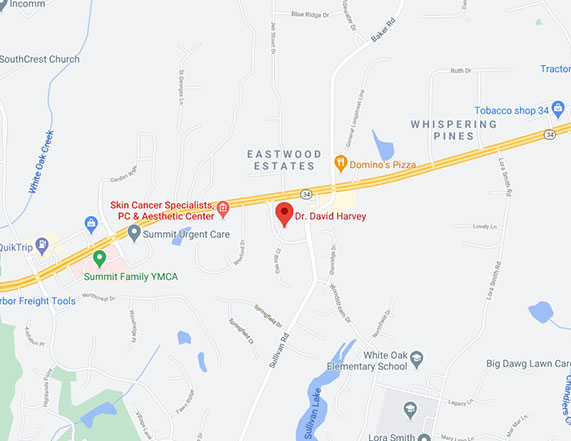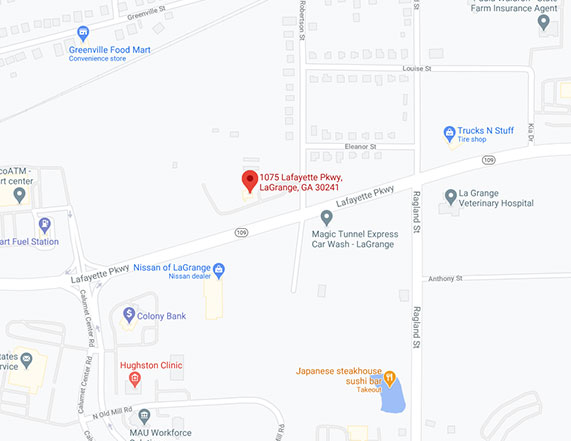Conveniently located to serve Newnan, Peachtree City and LaGrange
Click here to jump to:
Newnan Herpes Simplex
WHAT IS IT?
Herpes Simplex (HSV) is a common virus which can cause blisters and sores around the mouth, nose, genitals, and buttocks. When new lesions occur, they can develop almost anywhere on the skin.
For many patients, HSV infections can be annoying because they reappear periodically. The sores may be painful and unsightly. For chronically ill people and newborn babies, the infection can be serious and rarely fatal. There are two types of HSV – Type 1 and Type 2.
HERPES SIMPLEX VIRUS TYPE 1

Often referred to as the fever blister or cold sore virus, HSV- 1 infections present as tiny, clear, fluid-filled blisters that often occur on the lip, nose or eyelid. Less frequently, HSV 1 can occur in the genital area.
There are two kinds of HSV infections – primary and recurrent. Although most people get infected when exposed to the virus, only 10 percent will actually develop sores. The blisters of a primary infection usually appear from two to twenty days after initial contact with an infected person. They can last from seven to ten days unless treated with medications.
Before the blisters appear, the skin may itch, sting, burn, or tingle. This is very important prodrome to remember- symptoms without lesions. Blisters can break as a result of minor injury and this can result in oozing and crusting. Eventually, the crusts fall off, leaving red and depressed small marks on the skin.
Sores from a primary HSV-1 infection usually heal completely. They rarely leave a scar. However, it is important to remember that the HSV-1 virus infection remains in the body. It moves to centrally localized nerve cells where it remains in a resting state.
Recurrent infections tend to be a more mild event. They can be set off by a variety of factors including a cold, sun exposure, a menstrual period, trauma (including surgery), or emotional stress.
HERPES SIMPLEX VIRUS TYPE 2
Infection with HSV -2 usually results in sores on the buttocks, penis, vagina, or cervix, beginning two to twenty days after contact with an infected person. Sexual intercourse is the most frequent means of getting the infection. The virus affects anywhere between five and twenty million people, up to 20% of all sexually active adults in the United States.
Both primary and repeat attacks can cause symptoms from a minor rash to painful sores to a burning sensation with urination. HSV-2 may also occur in other locations, but usually the rash develops below the waist.
As with Type 1, sites and frequency of repeated bouts vary. The initial episode can be so mild that a person does not realize that he or she has an infection. Years later, when there is a recurrence of HSV, it may be mistaken for an initial attack, leading to unfair accusations about the source of infection.
Related
Content
Patient
Review
“Dr. Harvey and his staff are awesome–friendly, professional and efficient.”
by CS
HOW DOES ONE SPREAD HERPES?
Most people spread HSV via close contact with family members or friends who carry the virus. It can be transmitted routine events like kissing, sharing eating utensils, or by sharing towels. The lesions of both types of herpes simplex, can be spread by touching an unaffected part of the body immediately after touching a herpes lesion.
HOW ARE THE HSV INFECTIONS DIAGNOSED?
The appearance of HSV is often typical and no testing is needed to confirm the diagnosis. If diagnosis is uncertain, a swab from the infected skin may be taken and sent to the laboratory for analysis. Laboratory tests include special microscopic examinations and blood tests for antibodies. Some tests are only valid in the early stages, and more than one of these tests may be required to confirm the presence of herpes. Genital herpes can be mistaken for other diseases, including syphilis. A small number of women with genital herpes do not know that they have it because it occurs on the cervix.
HOW ARE HERPES INFECTIONS TREATED?
Oral anti-viral medications such as acyclovir, famciclovir, or valacyclovir have been developed to effectively treat herpes infections. These medications are used to treat local outbreaks or can be used to suppress herpes recurrences. For pain or fever, oral acetaminophen or ibuprofen may be taken.
HOW DO YOU PREVENT TRANSMISSION?
With oral HSV-1 herpes, one should avoid kissing, sharing cups, or lip balms. For persons with genital herpes, this means avoiding sexual relations, including oral/genital contact during the period of symptoms or active lesions. Condoms can help prevent transmission of genital herpes between sexual partners and should always be used. However, they will not protect against the virus that may be living on nearby genital skin that is not covered by the condom.
CAN HERPES BE SPREAD IF THERE IS NO VISIBLE SORE?
Yes. Patients have been aware for many years that if they kissed someone while having a fever blister, or had sex with their partner with an outbreak of genital herpes, they were likely to transmit the virus. However, most herpes is transmitted in the absence of lesions! It is now estimated that over 80% of all genital herpes is transmitted when there are no lesions and no symptoms. This phenomenon is known as asymptomatic viral shedding. People who never recall having had an outbreak of genital herpes can have positive blood tests for antibodies to herpes and can shed the virus. Taking antiviral medications daily reduces both viral shedding and disease transmission.
WHAT ARE SOME OF THE OTHER SERIOUS IMPLICATIONS OF HSV?
Eye Infections – HSV infection of the eye can lead to herpes keratitis with pain, light sensitivity, and a gritty sensation in the eye. Without prompt treatment, scarring of the eye may result. Fortunately, there are drugs available to eliminate infection and prevent severe scarring in the cornea.
lnfections in Pregnancy – A pregnant woman who has genital herpes at the time of childbirth may transmit the virus to her baby as it passes through the birth canal. If the birth occurs during the mother’s first episode of genital herpes, the baby may suffer severe damage. Women who know that they have had genital herpes or think they might have it during their pregnancy should tell their physicians so that steps can be taken proactively to protect the baby.
Pregnant women should avoid sexual contact with a partner who has active genital herpes, especially late in the pregnancy, or they must routinely use condoms.
The newborn can also be infected by exposure to the virus from non-genital lesions. If the mother or a person working in the nursery has active blisters on the lips or hands, the baby can become infected. Family members and friends with active HSV should not handle a newborn child.
HSV can be life-threatening to a person who has cancer, an individual with AIDS, a person who has had an organ transplant, or anyone who has some other major illness, because their immunity to infection has been reduced.
CAN HSV BE CURED?
There is no known current cure for HSV. Vaccines are being worked on at the present time. For more information on herpes simplex or to set up a consultation, click here. Thank you and we look forward to helping you.
Herpes Network – an excellent source for the latest treatments available for herpes and a list of support groups. http://www.herpes.org.











